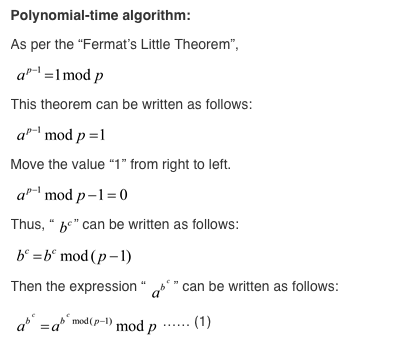Answered step by step
Verified Expert Solution
Question
1 Approved Answer
Give a polynomial-time algorithm for computing a^(b^c) mod p, given a, b, c, and prime p. Chegg gives the answer below but why does b^c=b^c(mod
Give a polynomial-time algorithm for computing a^(b^c) mod p, given a, b, c, and prime p. Chegg gives the answer below but why does b^c=b^c(mod p-1). How did it get like that?

Polynomial-time algorithm: As per the "Fermat's Little Theorem" = 1 mod p This theorem can be written as follows: ap-1 mod p =1 Move the value "1" from right to left ap-1 mod p-1=0 Thus, be" can be written as follows: be=b' mod (p-1) Then the expression a' " can be written as follows: abc =ab, mod ( p-I'mod p (1)
Step by Step Solution
There are 3 Steps involved in it
Step: 1

Get Instant Access to Expert-Tailored Solutions
See step-by-step solutions with expert insights and AI powered tools for academic success
Step: 2

Step: 3

Ace Your Homework with AI
Get the answers you need in no time with our AI-driven, step-by-step assistance
Get Started


